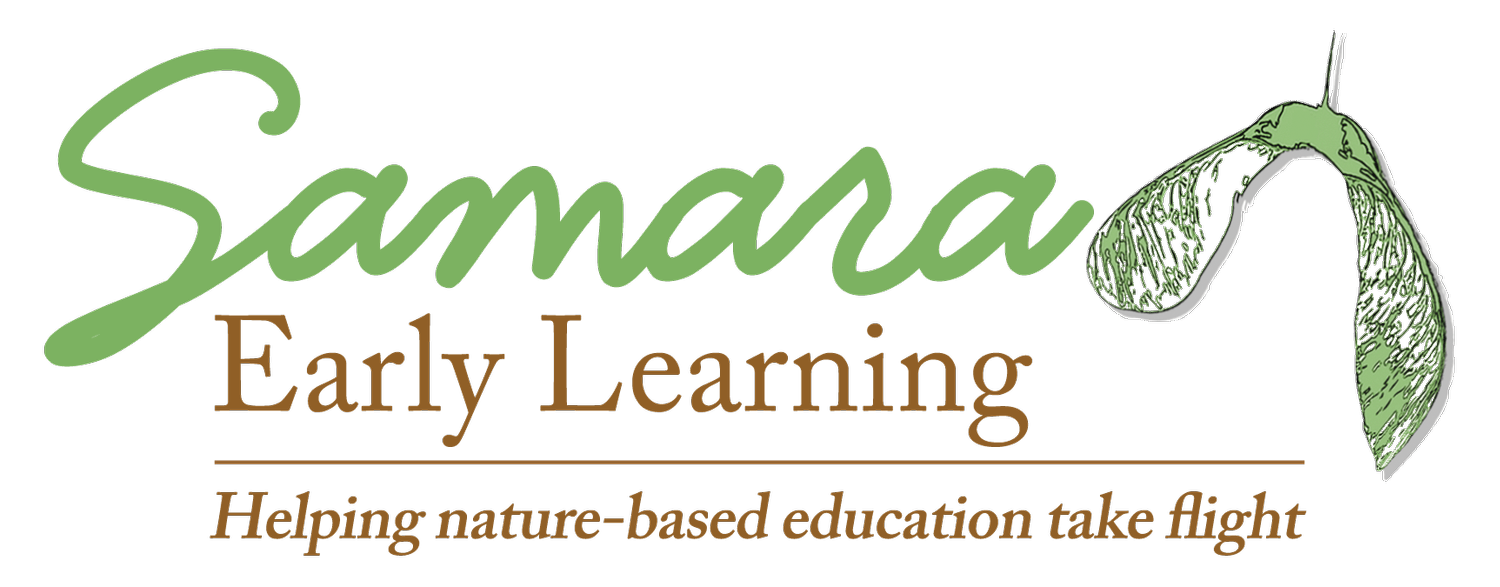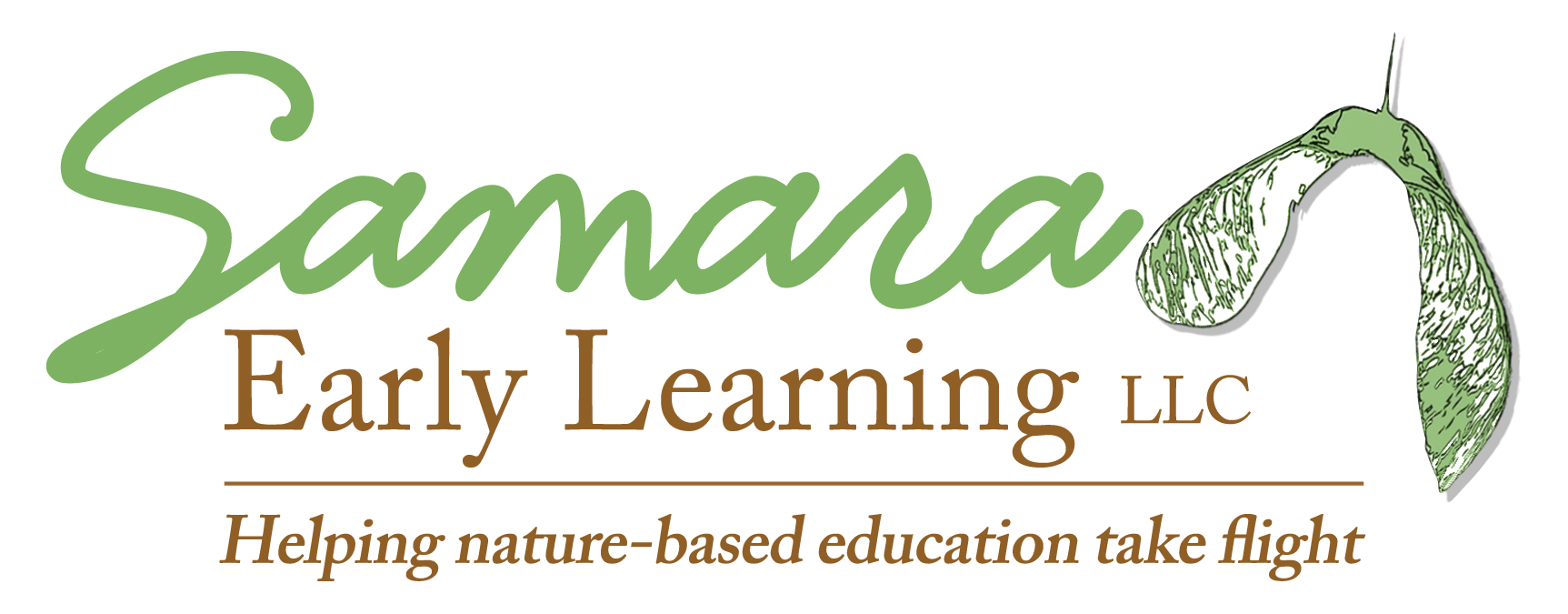About Samara Early Learning
We help educators create nature-based schools or add the nature-based approach to existing programs. With our support on the business or teaching side of operations, educators help young children learn with nature to expand their worlds and live rich, full lives.
Our vision
We envision a world where all young children learn with nature as part of their formal education in order to expand their worlds and live rich, full lives.
Our mission
Samara’s mission is to help early childhood educators implement high-quality nature-based education in order for young children to learn with nature to expand their worlds and live rich, full lives.
Bringing the vision & mission to life
To accomplish this, our work falls into three broad categories:
Help organizations or individuals start nature-based schools
Help education leaders grow nature within their existing curriculum
Conduct research related to nature-based teaching and learning
This work includes publications, courses, a membership community, workshops, coaching, and consulting.
Our guiding principles
-
Humans are part of the natural system, not separate from it. As a result, our physical health depends on the natural world. Our social-emotional and spiritual health also depends on the natural world. This is true of all humans—no matter their age, ability, ethnicity, class, whether they live in urban or rural settings, etc. Not only is human health, in all forms, impacted by the natural world, we recognize human behaviors directly impact the natural world.
In our work with education leaders and schools, we support all types of early childhood programs—whether they serve students in urban, rural, high-income and/or lower-income areas—in their efforts to implement a nature-based approach. We also serve all programs no matter their starting point on the continuum of implementation of the nature-based approach, so long as we have a shared vision of what we’re working toward. Internally, we live this belief at Samara Early Learning by being conscious of how our business decisions impact the natural world and making reasonable adjustments to reduce negative impacts while maximizing positive ones. Further, we ensure our team members have time and opportunities to nurture their own connection with the natural world.
-
Learning, and thus teaching, are socio-cultural activities. That is, we learn by reflecting on our experiences with someone else, and within a particular cultural context. This philosophy aligns with social-constructivist perspectives articulated by a variety of education theorists including Vygotsky.
While this philosophy is demonstrated in our perspectives on working with children, it also emerges in how we work with clients. We believe in a mentoring rather than a contracting approach. In other words, we believe in building the client’s capacity to do this work on their own rather than us doing it for them. Further, applying socio-cultural values means relationships matter. The connections we make with one another influence our ability to reflect on and learn from our experiences.
-
Just as diversity in the natural world makes for a healthier system, so does diversity in education. As such, diversity is not something to tolerate, but embrace. Diverse perspectives and experiences provide more opportunities to learn and in turn improve our practice. Embracing diversity also means valuing and sustaining the cultures we work within.
In our work with schools and education leaders this means we not only acknowledge the specific context but leverage that culture as an asset. It’s for this reason we see the nature-based approach as a set of principles rather than a predetermined script or checklist of practices that must be implemented. There is no one “right” way to implement a nature-based approach. Instead, the approach must be responsive to the unique context where it is being implemented.
-
Systematic study of the world is foundational to our experiences with nature as well as our teaching and learning. This is true for our impacts on the environment as well as how we interact with children.
In our work this means supporting pedagogy which encourages children’s scientific sensemaking of the natural world. It also means continual investigation of the best teaching practices to ensure we’re efficiently achieving our desired outcomes. Through active participation in research along with supporting practitioners we bridge the gap between research (i.e., academia) and practice. True to science we also continue to refine and revise our understanding of best practices over time.
Why the name "samara"?
The term “samara” is meaningful for several reasons. First, it is the scientific term for the helicopters, whirlybirds, or whirligigs that children often play with. There’s pure joy is tossing a samara into the air and watching it twist and whirl its way to the ground! Nature-based early childhood education is of course focused on providing children with joy-filled experiences and learning opportunities.
Second, the name represents the intersection of personal connection and meaning with scientific naming and categorizing. Technically a samara is an indehiscent, usually one-seeded, winged fruit from a plant such as the elm or maple tree. By helping kids understand that helicopters have another, more scientific name we are supporting their language, comfort, and identity as a scientist—someone who studies the natural world around them.
Third, the appearance of samaras varies by species based on the particular context where it grows, and yet all meet the basic criteria for being considered a samara. This is true for nature-based early childhood education programs as well. There are core commonalities in philosophy and pedagogy, but the details will vary depending on environmental, cultural, and community context.
Fourth, the maple samara has personal significance to our founder as a symbol of the arrival of spring in her home in the upper Midwest. In early spring the maple tree provides the sweet sap that is made into maple syrup. Later in spring the leaves and samaras emerge on the tree. Both are symbols of renewal, growth, and hope for the future. Nature-based early childhood education is inherently hopeful for the future as we are investing in the health and well-being of future generations.
Now that we’ve explained why we chose “samara” we should discuss pronunciation. The word can be pronounced “sam-er-uh” or “suh-mair-uh.” We typically use “suh-mair-uh,” but you can say it whichever way you choose. In fact, in the end we don’t care how you pronounce the name so long as you call us when you’re in need of administrative, curricular, or research help related to nature-based early childhood education.


